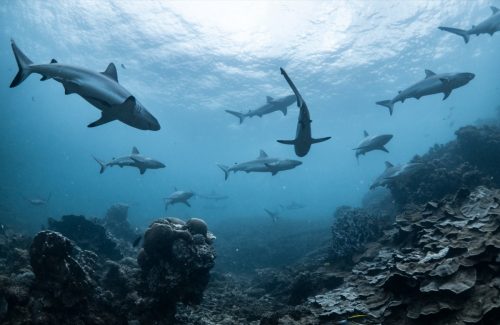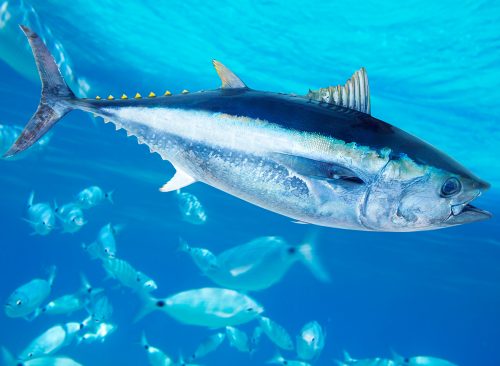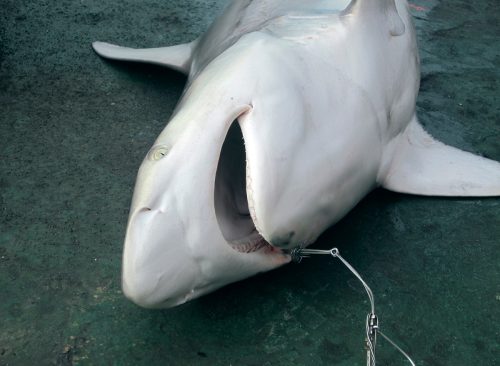The Real Reason Why Sharks Are Facing Extinction
"They are incredibly important to the health of our planet."

Thanks to a certain iconic movie, sharks have been established in the popular consciousness as a major threat to humans. In reality, the tables are turned. A new study has found that after declining for decades, tuna and billfish species (such as black marlin and swordfish) are rebounding, largely thanks to actions taken by fisheries and conservationists. But sharks are in trouble. Sharks—the biggest fish in the sea—are often caught by accident in fisheries' traps that are intended for smaller fish like tuna.
Without active strategies to address that issue, sharks' chance of extinction is rising, researchers say in the Nov. 11 issue of Science. "While target species such as tunas and billfishes are increasingly managed at sustainable levels, shark species taken as bycatch by the same fisheries continue to decline due to insufficient management actions," said Maria Jose Juan Jorda of Simon Fraser University. Read on to find out why you should care about saving the shark population—and to boost your brain, don't miss these mind-blowing 10 Most "OMG" Science Discoveries of 2022.

In the study, the scientists analyzed the extinction risk of 18 species of large ocean fish over nearly seven decades by looking at the International Union for Conservation of Nature's Red List, which tracks changes in the extinction risk of various species. It's updated every four to 10 years.
The researchers zeroed in on tunas, billfishes, and sharks. They used the Red List to track the average age at reproductive maturity, changes in population size, and abundance of seven tuna species, six types of billfish, and five species of shark. Then, they calculated the extinction risk for those 18 species from 1950 to 2019.

The researchers found that the extinction risk for tunas and billfishes increased throughout the last half of the 20th century, then began to decline for tunas in the 1990s and billfishes in the 2010s. The news is not so good for sharks—their numbers have continued to decline.
"While we are increasingly sustainably managing the commercially important, valuable target species of tunas and billfishes," writes Juan-Jordá, "shark populations continue to decline, therefore, the risk of extinction has continued to increase."

Most people only know about sharks as dangerous threats to humans—from the iconic movie Jaws to TV's Shark Week to last summer's reports of increased shark sightings (and some attacks) along the U.S. coastline. So why should we care about preserving shark populations?
"Sharks play a crucial role in healthy ocean ecosystems because they are a top predator—they keep prey species populations at a healthy level and prevent algae overgrowth that advances the decline of coral reefs," says the U.S. Fish and Wildlife Service. "They are incredibly important to the health of our planet."

When sharks are accidentally caught by fisheries, their numbers aren't easily replenished because they're relatively slow to reproduce. "Some species of sharks are particularly vulnerable to overfishing because they do not populate quickly," says the U.S. Fish and Wildlife Service. "Similar to humans, most shark species are long-lived, slow growing and take many years to reach sexual maturity. In addition, sharks give birth to few offspring at a time, have high juvenile mortality and infrequently reproduce."
Additionally, in some countries, sharks are targeted by fishermen simply for their fins, which are considered a delicacy. Dishes like shark-fin soup are sold for up to $100 a bowl. The practice of "shark finning" is prohibited in the U.S.

Juan-Jordá suggested some potential solutions for reversing sharks' declining numbers. These include establishing catch limits for certain species and sustainability goals within fisheries to limit the number of sharks that are incidentally caught. Those benchmarks would need to be tracked, she says. As of now, none of this being done; sharks have been left, well, out to sea.
"There is a clear need for significant improvement in shark-focused management, and organizations responsible for their management need to act quickly before it is too late," said Colin Simpfendorfer, a marine biologist at James Cook University in Australia.














